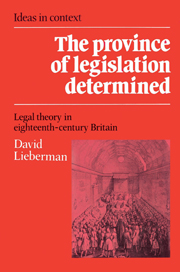Summary
The eighteenth century, according to the judgment of its current historians, was England's century of law. As E. P. Thompson has put it, “‘The Law’ [was] elevated during this century to a role more prominent than at any period” of English history. The culture of law, it is increasingly observed, extended throughout the social fabric, conditioning popular protest as much as formal public debate. “From the hue-and-cry to the macabre carnival of the public hanging,” notes Roy Porter, “the law and its execution were not just Government fiats or ruling-class weapons but an intimate part of community life.” Law and legal process were equally fundamental to the political dynamic of this community. “Most Englishmen experienced government and understood politics through their dealings with the law,” John Brewer has argued. In this society, “all parties – government, radical and spectators … recognized the potency of [the law's] symbols and rituals, knew how significant a platform its institutions provided and what a powerful legitimizing force its endorsement could be.” Even Sir Lewis Namier was forced to conclude that, “in the eighteenth century, Parliamentary politics were transacted, to a disastrous extent, in terms of jurisprudence.”
These remarks echo those of contemporary observers who were also struck by the distinctiveness of England's fabric of legality. Montesquieu, in a celebrated and much repeated judgment, reported that England boasted the only constitutional order which had political “liberty” for its “direct end.”
- Type
- Chapter
- Information
- The Province of Legislation DeterminedLegal Theory in Eighteenth-Century Britain, pp. 1 - 28Publisher: Cambridge University PressPrint publication year: 1989

